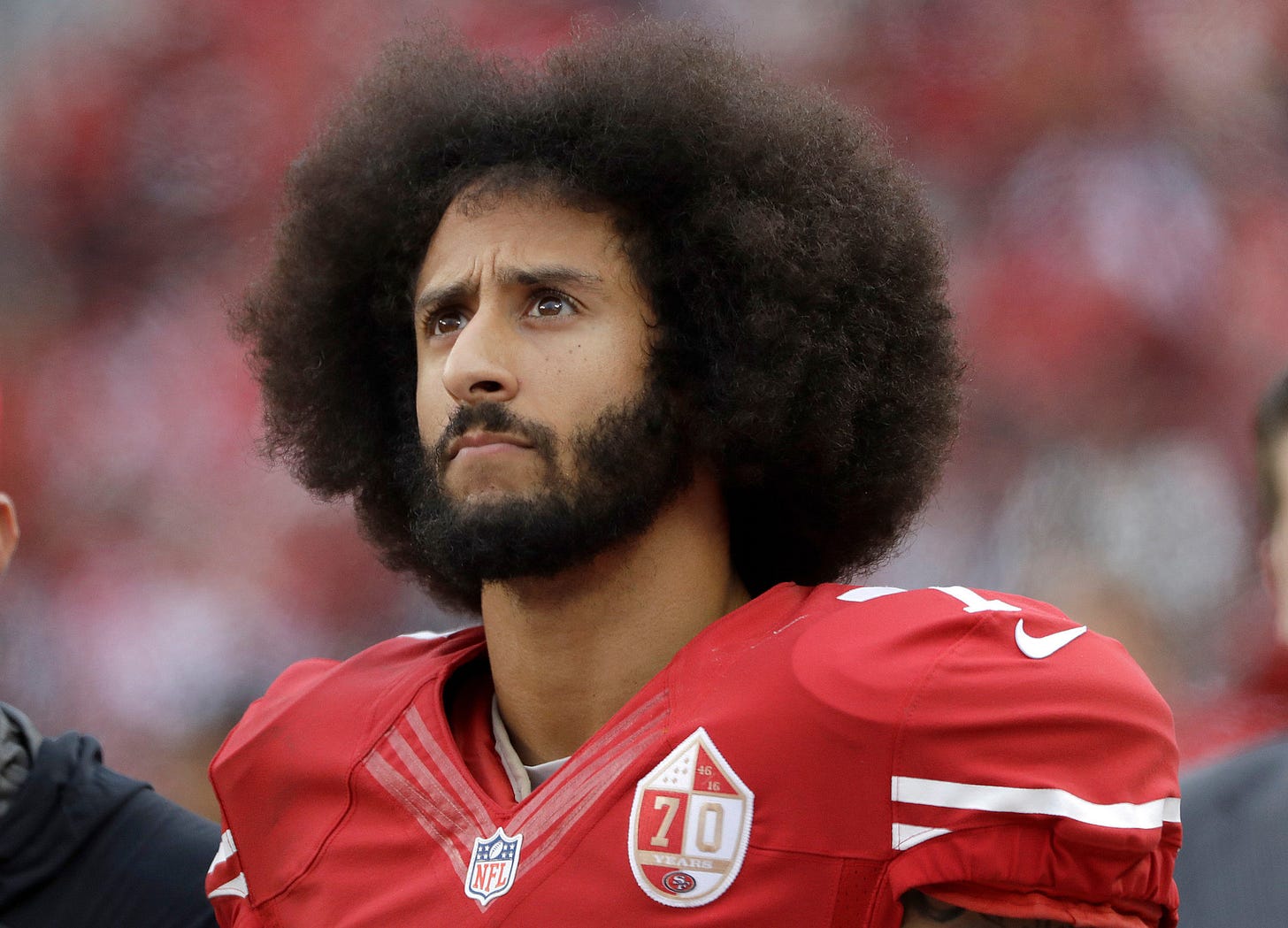Activism and Abdication - a Disney Story
This week we gab about Colin Kaepernick's production deal with The Walt Disney Company and what it means when companies take up activism.
Just over two weeks ago, Colin Kaepernick and Walt Disney announced they were joining together on a production deal to have the activist produce:
The deal spans all Disney platforms: Disney Television, Hulu, ESPN, Pixar, and The Undefeated and gives Disney right of first refusal to Kaepernick’s production company, Ra Vision Media. For a company that ordinarily eschews social justice, this is seen by many as an exciting move.
A docuseries about the five years of Kaepernick’s life since he began to take a knee in protest of police brutality and racism is already underway with ESPN. Notably, the series will be produced by Jemele Hill, who in 2017 was removed from the network’s crown jewel program, Sports Center, after correctly tweeting that Donald Trump was a “white supremacist”.
ESPN has traditionally strained to cover sports as though they exist outside of our shared reality, failing to connect the very real people that they broadcast with anything occurring outside of fields, courts, or front offices. So, it’s a welcome surprise for them to bring on Kaepernick, who enlisted Hill, to give voice to important sports-adjacent topics. ESPN has massive reach, and it’s exciting for the network to leverage an activist like Kaepernick as a conduit for sharing more Black and Brown voices, especially to an audience that has a sizable ‘stick to sports’ contingent.
This all becomes harder to reconcile when Disney’s ownership of ESPN is taken into account. Disney’s two US theme parks, beacons of cheer for its visitors, paradoxically pay many of their workers immiserating wages. Hundreds of employees at both parks live out of cars and motels, often without health insurance.
Just after the Kaepernick deal was disclosed, DisneyWorld announced it would be reopening after briefly shutting down in response to the ongoing Covid-19 pandemic. This reopening takes place in the midst of DisneyWorld’s home state of Florida setting daily records for new Covid cases. Despite precautions, it takes a brazen amount of greed for a company with an average executive salary of $215,930 to endanger thousands of low-wage workers simply so people can get their Hall of Presidents fix.
(President Trump’s likeness at DisneyWorld’s Hall of Presidents ride. Annotation is my own.)
There are over 100,000 employees at Disney’s US parks and according to Disney, “72% of its US workforce are women and/or people of color”. Although Disney deliberately makes it impossible to parse out what percentage of its US workforce are people of color, the aforementioned percentage leads us to believe it’s significant.
In past years, The Walt Disney Company has paid a semi-annual dividend of $1.5 billion to its shareholders. If the company wanted to bring forth meaningful change from its big animated bosom, it could start by dipping in to this dividend and paying everyone who works at its parks a living wage. Within a short time period, Disney’s park workers, many of whom are black and brown, would be situated with better healthcare, better educational outcomes for their children, and more stable living situations.
Amplifying Black and Brown voices is important, especially for a company who between the years of 2007 and 2016, employed zero black directors for its largest films. While this partnership will give both employment and a larger audience to underrepresented artists, the impact is less immediate and less meaningful than just giving people the requisite money to not live on the precipice of homelessness, bankruptcy, and extreme hunger.
America’s past and present unwillingness to create systems of government that engender equality has left space for corporations to co-opt the push for equality. At the current moment, the steps that our government are taking towards equality can best be described as sclerotic. Businesses can expediently make change in ways government can’t - they’re subject to less oversight, have less accountability, and with the exception of maybe Abraham Lincoln, have more goodwill than the government.
(Lincoln’s likeness at DisneyWorld’s Hall of Presidents ride. Quote is speculative, based on the author's interpretation of history.)
Through private sector cooption and government abdication, the push for equality becomes profit-driven. Disney, like any company, made a cost-benefit analysis. A production deal with Colin Kaepernick is cheaper and easier to publicize than providing livable wages to its park employees. The multinational will experience additional cost savings by using its vast broadcasting economies of scale to promote both the partnership itself as well as the products that it makes. Disney will get a lot of good press, improve its public image, and make a bunch of money, without having to spend a ton to do so.
It doesn’t have to be an either/or scenario. Disney makes enough money to give Kaepernick a platform and to pay its employees. It’s just that with the government out to lunch, social change is yet another area for companies to find the fattest margins.
Song of the post: Because we still have a long way 2 go







amen to this. sitting on phone calls about 'brand response' to the pandemic is incredibly nauseating. if brands want to capitalize on a movement, they have to be held accountable to putting their money where their mouth is and going deeper than self-congratulatory ad campaigns. in 2000 i spent a month in winter park florida with the working poor of the area. many of them were working for theme parks by day and then taking refuge in the local town's program to house and feed their children because the cost of living was too high for them to afford. thanks for your words on this. ill be sharing it around as i jam to this hot cassie traxx